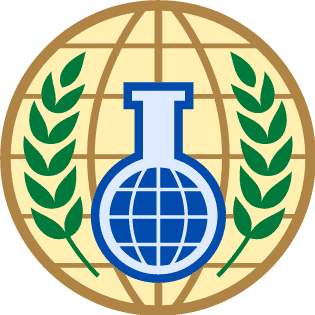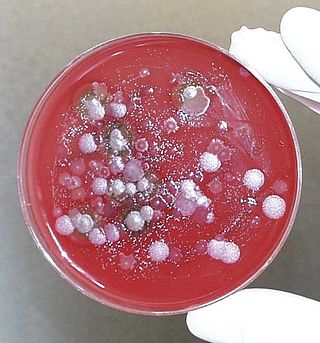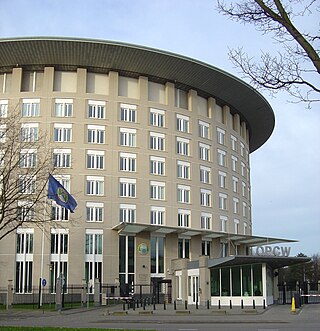Related Research Articles

The Organisation for the Prohibition of Chemical Weapons (OPCW) is an intergovernmental organisation and the implementing body for the Chemical Weapons Convention (CWC), which entered into force on 29 April 1997. The OPCW, with its 193 member states, has its seat in The Hague, Netherlands; it oversees the global endeavour for the permanent and verifiable elimination of chemical weapons.
The Protocol for the Prohibition of the Use in War of Asphyxiating, Poisonous or other Gases, and of Bacteriological Methods of Warfare, usually called the Geneva Protocol, is a treaty prohibiting the use of chemical and biological weapons in international armed conflicts. It was signed at Geneva on 17 June 1925 and entered into force on 8 February 1928. It was registered in League of Nations Treaty Series on 7 September 1929. The Geneva Protocol is a protocol to the Convention for the Supervision of the International Trade in Arms and Ammunition and in Implements of War signed on the same date, and followed the Hague Conventions of 1899 and 1907.

The Chemical Weapons Convention (CWC), officially the Convention on the Prohibition of the Development, Production, Stockpiling and Use of Chemical Weapons and on their Destruction, is an arms control treaty administered by the Organisation for the Prohibition of Chemical Weapons (OPCW), an intergovernmental organization based in The Hague, The Netherlands. The treaty entered into force on 29 April 1997. It prohibits the use of chemical weapons, and also prohibits large-scale development, production, stockpiling, or transfer of chemical weapons or their precursors, except for very limited purposes. The main obligation of member states under the convention is to effect this prohibition, as well as the destruction of all current chemical weapons. All destruction activities must take place under OPCW verification.

Disarmament is the act of reducing, limiting, or abolishing weapons. Disarmament generally refers to a country's military or specific type of weaponry. Disarmament is often taken to mean total elimination of weapons of mass destruction, such as nuclear arms. General and Complete Disarmament was defined by the United Nations General Assembly as the elimination of all WMD, coupled with the “balanced reduction of armed forces and conventional armaments, based on the principle of undiminished security of the parties with a view to promoting or enhancing stability at a lower military level, taking into account the need of all States to protect their security.”

The Hague Conventions of 1899 and 1907 are a series of international treaties and declarations negotiated at two international peace conferences at The Hague in the Netherlands. Along with the Geneva Conventions, the Hague Conventions were among the first formal statements of the laws of war and war crimes in the body of secular international law. A third conference was planned for 1914 and later rescheduled for 1915, but it did not take place because of the start of World War I.

Nederlandse Organisatie voor Toegepast Natuurwetenschappelijk Onderzoek is an independent statutory research organization in the Netherlands that focuses on applied science. It conducts contract research, offers specialist consulting services, and grants licenses for patents and specialist software. TNO also sets up new companies to market innovations.

A biological agent is a bacterium, virus, protozoan, parasite, fungus, or toxin that can be used purposefully as a weapon in bioterrorism or biological warfare (BW). In addition to these living or replicating pathogens, toxins and biotoxins are also included among the bio-agents. More than 1,200 different kinds of potentially weaponizable bio-agents have been described and studied to date.

José Maurício de Figueiredo Bustani is a Brazilian diplomat who was the first director-general of the Organisation for the Prohibition of Chemical Weapons until he was ousted after pressure from the US government in April 2002 over disagreements about how to address Iraq's alleged weapons of mass destruction.

Albania once possessed a stockpile of weapons of mass destruction. This stockpile of chemical weapons included 16,678 kilograms (36,769 lb) of mustard gas, lewisite, adamsite, and phenacyl chloride (chloroacetophenone).

Lamberto Zannier is an Italian diplomat and lawyer.

The World Forum is a concert venue and convention centre in The Hague, Netherlands, near the buildings of the International Criminal Tribunal for the former Yugoslavia, the Organisation for the Prohibition of Chemical Weapons and one of the administrative offices of the International Baccalaureate.

The 2013 Nobel Peace Prize was awarded to the Organisation for the Prohibition of Chemical Weapons for their "extensive work to eliminate chemical weapons". The award citation indicated the organization was awarded the prize, because they "have defined the use of chemical weapons as taboo under international law. Recent events in Syria, where chemical weapons have again been put to use, have underlined the need to enhance the efforts to do away with such weapons." The committee criticized Russia and the United States for not meeting the extended deadline for destruction of its chemical weapons, and noted that certain countries "are still not members". The OPCW was the 22nd organization to be awarded the prize.

The Spiez Laboratory is the Swiss institute for the protection of the population against nuclear, biological and chemical threats and dangers. It is part of the Federal Department of Defence, Civil Protection and Sports (DDPS) and is located in Spiez. The Spiez Laboratory is one of the five labs in the world permanently certified by the Organisation for the Prohibition of Chemical Weapons.

The Day of Remembrance for All Victims of Chemical Warfare is an annual event held November 30 as a "tribute to the victims of chemical warfare, as well as to reaffirm the commitment of the Organisation for the Prohibition of Chemical Weapons (OPCW) to the elimination of the threat of chemical weapons, thereby promoting the goals of peace, security, and multilateralism." It is officially recognised by the United Nations (UN) and has been celebrated since 2005. On the 2013 observance day, the UN Secretary-General Ban Ki-moon gave a speech where he stated:
On this Remembrance Day, I urge the international community to intensify efforts to rid the world of chemical weapons, along with all other weapons of mass destruction. Let us work together to bring all States under the Convention and promote its full implementation. This is how we can best honour past victims and liberate future generations from the threat of chemical weapons.
The OPCW–The Hague Award is an annual award founded by the OPCW as a result of their being presented with the 2013 Nobel Peace Prize. The purpose of the Award is to honour and recognize individuals and institutions that have significantly contributed towards the goal of a world free of chemical weapons.
The United Nations Secretary-General's Mechanism for Investigation of Alleged Use of Chemical and Biological Weapons (UNSGM), is a tool that allows the Secretary-General to investigate alleged uses of biological or chemical weapons. The UNSGM is not a standing investigative body, but instead relies on a member state-provided list of qualified experts, consultants, and analytical laboratories that may be activated on short notice to support UNSGM investigations.

Annika Lisa Markovic is a Swedish diplomat who became the incumbent ambassador to Austria since 2021. She has formerly been appointed as the ambassador to the Netherlands from 2018 to 2021, Brazil from 2008 to 2011, and the Philippines from 2003 to 2007.
References
- 1 2 3 4 5 6 "Arie Jacobus Johannse Ooms" (PDF). Chemistry Historical Group. Retrieved 2023-03-03.
- ↑ "People". Harvard Sussex Program. Retrieved 2023-03-03.
- ↑ "List of participants". International School of Disarmament and Research on Conflicts. Retrieved 2023-03-03.
- ↑ "Letter dated 5 August 1998 from the executive chairman of the Special commission established by the S-G pursuant to paragraph 9 (b) (i) of Security Council resolution 687". ReliefWeb.int. United Nations. 1998-08-05. Retrieved 2023-03-03.
- ↑ "OPCW Pays Tribute to Dr Arie Jacobus Johannes Ooms (1925–1999)". Organisation for the Prohibition of Chemical Weapons. 2006-04-27. Retrieved 2023-03-03.